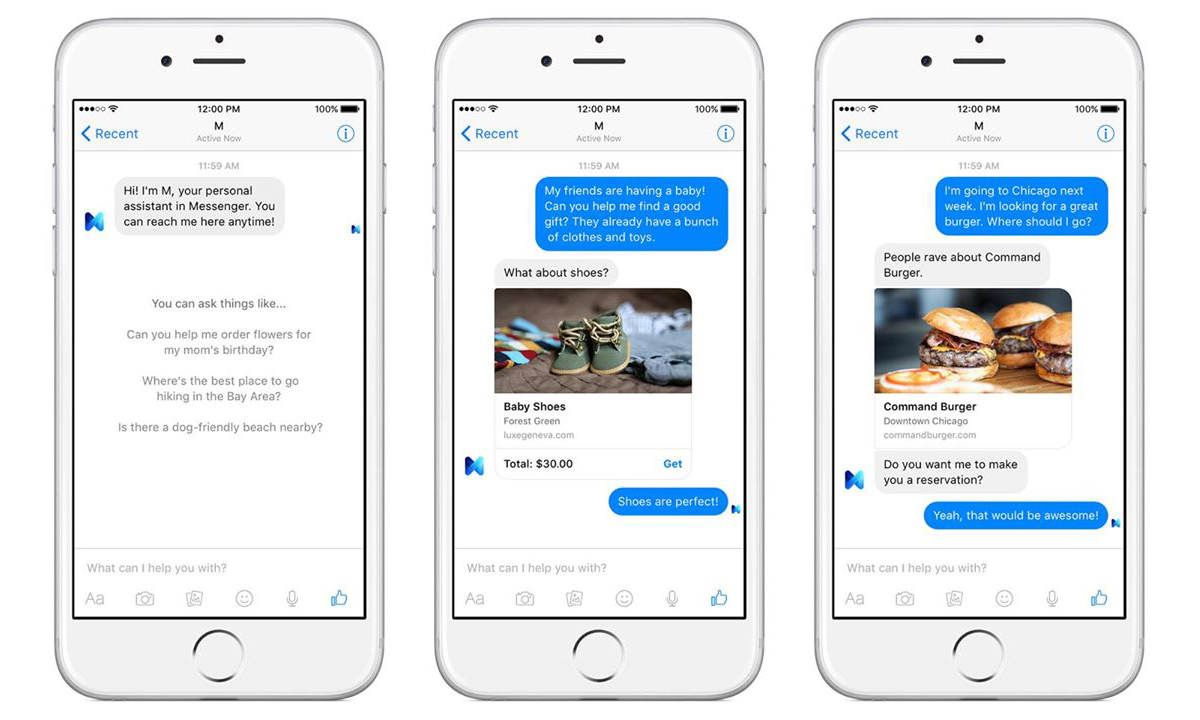 Facebook's Vice President of Messaging Products David Marcus, announces a Facebook's personal assistant for its users. Called M, it's designed to be used like Siri, Now and Cortana.
Facebook's Vice President of Messaging Products David Marcus, announces a Facebook's personal assistant for its users. Called M, it's designed to be used like Siri, Now and Cortana.
Using AI to ease tasks is nothing new anything new. But with Facebook entering the world of personal digital assistant, the company is not just entering the AI competition where other big players have thrived, but it also made Facebook and its users' life easier.
Announced on August 26th, 2015, M is meant to be an AI-based service unlike others in the market
M lives inside Messenger. To use the digital assistant, the user can message M like they would do to other Messenger contact. Talk like usual and say your request, and M will answer, or ask followup questions if necessary.
By using M frequently, M can learn about its user's preferences based on conversations. Since it doesn't pull data from the rest of Facebook existence, what M does is making suggestions based on what it learns. With Messenger Business incorporated, users can also make purchases straight from the app,
Just like other personal assistant which the user can use to ask for recommendations, M can give ideas about gifts the user wants to give to friends, or restaurants to visit while the user is travelling. M also does what most digital assistants do: it can search the internet, update information on travel plans, and make reservations.
But what makes M interesting is that it also has a human element. The digital assistant uses AI that is "trained" by human operators who can take requests.

According to Marcus, M is a different kind of AI assistant. First, M isn't just backed by computer smarts; it's also powered by actual people. And second, it doesn't just help users to get things done - it can also complete tasks.
"It's powered by artificial intelligence that's trained and supervised by people," explained Marcus announcing the initial test launch of the service.
For example, M can can purchase items and get them delivered to friends and family, make travel arrangements, and book appointments or reservations at restaurants.
With the ability to do certain task others in the competition have yet able to do, Facebook wants M to be your go-to source for mobile discovery, replacing the needs to use multiple apps like Google Maps, Yelp, Uber, and OpenTable to get a task done.
One another thing that makes M a little different from others is that unlke Siri and Cortana which are both "females" in the country they were born (U.S.), M is "genderless". And with AI and human "M trainers" powering its queries, there is no saying when a question answered is actually from pure AI or people helping the algorithms.
Other than that, M is more focused in accomplishing actual task, rather than helping its users plan a schedule or search the internet for information.
Initially launched as beta, Facebook began rolling out M to a couple hundred Facebook Messenger users, and slowly expand to more users.
Blending Human And AI
The M personal assistant is a hybrid that blends AI with human. M can potentially be the best of the both worlds when it can know which questions are best handled by machines and which require human intervention.
Despite others in the competition are using pure AI to power their digital assistant, using humans to "train" AI is a not a new concept. A field of research known as "human computation" is all about the study of effectiveness in blending human interactions with AI.
The research is built on the premise that if an algorithm is viewed as a set of processes, some of those processes could be performed by a computer while some others could be performed by a human.
M is born from this concept, and Facebook acknowledged that humans working with algorithms can generally do better than humans or algorithms working alone.
The disadvantage of using humans to intervene AI is to figure out the the interface between humans and computers. Like for example, when should humans do the work, and when should algorithms? Should the algorithms be in charge of the humans, or humans in charge of AI?
When regarding M, Facebook must have the balance between AI and human in processing queries to make it successful. Both to make M cost effective, and to ensure that people's questions are answered appropriately.
With Facebook having one of the most detailed information about its users and their relations with others, M is potentially dangerous to those that concern privacy. Initially, M doesn't take any data from Facebook. But there is no saying when Facebook will, or won't, use its massive user information database to make M more powerful.
And as Facebook;s founder Mark Zuckerberg said 1 billion users worldwide were active on Facebook in a single day, and hundreds of millions are already on Messenger. The digital assistant M is having a potentially much larger audience that either Siri or Cortana.